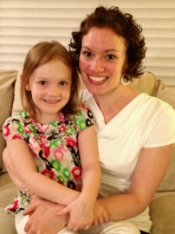

I was 31 years old when I was diagnosed with stage III ovarian cancer in November 2010.
It had been a busy year so I was a few months past due scheduling my annual exam with my gynecologist. I was a single mom of a high-energy three year old, and was working nights as an RN in the NICU (neonatal intensive care unit) at Emanuel Hospital. I had started running three miles a day to train for the Hood to Coast Race in August 2011 and felt healthier than ever.
As I sat on the table in the doctor’s office while he explained to me how one ovary felt bigger than the other, I won’t say I wasn’t a little concerned. He wanted me to come back and have it checked again a couple of weeks later, and told me that it could just be from ovulating and where I was in my cycle. I had no idea the journey I was about to go on.
Two weeks later I went back to the doctor hoping that everything was going to be fine. However, I learned that my ovary was still enlarged; and was sent for a transvaginal ultrasound. This revealed a cyst with several small nodules and which appeared to be completely contained in the right ovary.
At this point, my gynecologist referred me to a gynecologic oncologist, whom I met with four days later. We talked about family history — My mom was diagnosed with breast cancer at the age of 45, but there was no other history of breast or ovarian cancer in my family.
The doctor explained to me that he would need to remove that right ovary due to its size and odd appearance. He told me that it would just be a day surgery and that I should be home by afternoon. He did caution me that there was a 20% chance that it could be cancer. We discussed that if it was cancer I would want him to do a full hysterectomy. While it was only a 20% chance, he did remind me that it was still 20%. I felt at ease with that percentage.
We scheduled the surgery for a couple of weeks out and in the meantime I had my blood drawn to check my CA125 level, and got a CT scan. At this point I was starting to have some periodic lower back pain on my right side. It wasn’t consistent and seemed to be worse after appointments when I had been examined. Because it wasn’t consistent I figured it was due to stress and nothing more. I had no other symptoms and did not feel like anything was wrong. My CT scan came back just showing the cyst on the right side but nothing more and my CA 125 level came back at 62. Not knowing what this really meant I called the nurse and asked her if I should be concerned with this and her first reaction was no, but then she hesitated and said “mother with breast cancer at 45, well maybe.” This was the first time I truly panicked and thought that I had cancer.
So, knowing that I shouldn’t, I turned to the internet and started to do some research looking for something that was going to tell me I did not need to worry. It seemed women with cancer had CA 125 levels in the hundreds or thousands, so I started to talk myself down.
I asked the gynecologic oncologist at my pre-op appointment and he said that there are many things that can cause an elevated CA 125 in a woman my age. He said the cyst alone can cause this slight elevation but we would not know for sure until surgery was done.
The plan for surgery was to remove one ovary through robotic laparoscopy and send me home by the afternoon. I woke up feeling good. When the gynecologic oncologist came in, he told me that I had a small tumor in my left ovary that neither the ultrasound nor the CT scan detected. It was cancer.
The cyst with the mass on the right side was not contained and was actually attached to my bowel as well. He ended up doing a full hysterectomy and staging. At a minimum, I was a high stage II from what he could tell. My doctor said the lymph nodes looked good, and hoped there weren’t any microscopic cells in them.
A few days later I got a call from my gynecologic oncologist letting me know that I was stage III B and did have microscopic growth in one node. He told me that my gynecologist saved my life. He then talked with me about treatment, which I started just a couple weeks later as part of a clinical study.
I did six rounds of intravenous Paclitaxel followed by intraperitoneal Cisplatin and Paclitaxel. With my second round of chemo, I was then started on Avastin as well. I continued that for the next 15 months as a maintenance drug. Due to my mother’s early-age breast cancer, and my ovarian cancer diagnosis, I underwent genetic testing. It turns out that I am BRCA1 positive, which means that I was at much higher-than-average risk of developing ovarian and/or breast cancer. So are my mom and two of my three sisters, and some extended family members as well. My odds of ovarian cancer weren’t actually 20%, but were 60%.
I am currently in remission and enjoying each day. I see my oncologist once every three months for follow up, and have CT scans every six months. Due to being BRCA1 positive, I will be undergoing a prophylactic bilateral double mastectomy this fall to decrease my risk of breast cancer.
While I wouldn’t choose this journey, I am grateful it was found when it was, and for the knowledge and awareness it has given me and my family.
